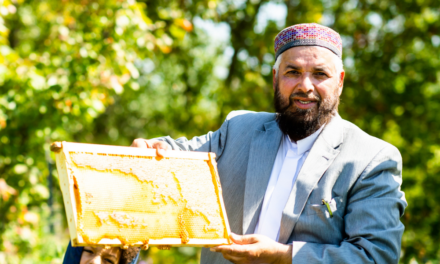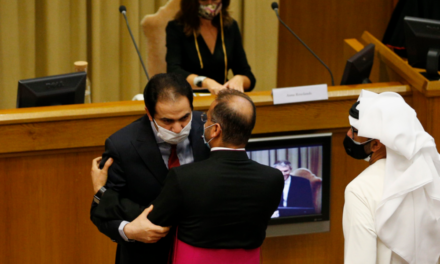Photo courtesy of Khartoum Kitchen
In Sudan, a long-building crisis has turned a political dispute between two military generals into a humanitarian catastrophe of unimaginable scale. More than 9 million people have had to flee their homes in what the International Rescue Committee called “the largest internal displacement crisis in the world.” Up to 150,000 are dead, radically more than earlier estimates.
Other wars and crises, particularly in Gaza and Ukraine, have made it more difficult for the urgent calls for international aid in Sudan to break through. With Sudan’s agriculture in ruins, and nearly all of the country’s banks robbed and emptied, famine is a real threat, as the New York Times has reported in disturbing detail. Many have already been dying from starvation, including babies. In many cases, relief efforts have been blocked by fighting, too.
In this chaos, Sudanese locals have taken up initiatives that offer a glimmer of hope. Privately funded community kitchens have sprung up across Sudan since the start of the war to help provide emergency relief to starving people. Many of these kitchens are supported by Sudanese people in the global diaspora, but they could be running out of money soon. Mohanad Elbalal, who is British Sudanese and is based in the U.K., helped to create Khartoum Aid Kitchen in coordination with his extended family members who have been displaced in the Sudanese capital. It now supports many kitchens across Khartoum in serving meals to over 10,000 people a day; out of desperation for funding, Elbalal is reliant on a crowdsourcing campaign to save lives. I called Elbalal to discuss the challenges faced by aid efforts, and how media coverage of other global crises has complicated efforts to publicly fund relief efforts in Sudan. This interview has been edited and condensed for clarity.
In Sudan, a long-building crisis has turned a political dispute between two military generals into a humanitarian catastrophe of unimaginable scale. More than 9 million people have had to flee their homes in what the International Rescue Committee called “the largest internal displacement crisis in the world.” Up to 150,000 are dead, radically more than earlier estimates.
Other wars and crises, particularly in Gaza and Ukraine, have made it more difficult for the urgent calls for international aid in Sudan to break through. With Sudan’s agriculture in ruins, and nearly all of the country’s banks robbed and emptied, famine is a real threat, as the New York Times has reported in disturbing detail. Many have already been dying from starvation, including babies. In many cases, relief efforts have been blocked by fighting, too.
In Sudan, a long-building crisis has turned a political dispute between two military generals into a humanitarian catastrophe of unimaginable scale. More than 9 million people have had to flee their homes in what the International Rescue Committee called “the largest internal displacement crisis in the world.” Up to 150,000 are dead, radically more than earlier estimates.
Other wars and crises, particularly in Gaza and Ukraine, have made it more difficult for the urgent calls for international aid in Sudan to break through. With Sudan’s agriculture in ruins, and nearly all of the country’s banks robbed and emptied, famine is a real threat, as the New York Times has reported in disturbing detail. Many have already been dying from starvation, including babies. In many cases, relief efforts have been blocked by fighting, too.
Do other global crises with more international visibility, like in Ukraine and Gaza, complicate your donations-based operation? A resident of Omdurman recently told Reuters, “The world is busy with other countries. We have to help ourselves, share food with each other, and depend on God.” Does that reflect your experience in trying to raise funds for Sudan?
Yes. I think that quote that you shared perfectly encapsulates how the majority of the people feel. There’s a feeling that prejudices might lead people to care less about what’s happening in Sudan. That this is just Africans killing Africans. Sudanese people do feel forgotten, because most people haven’t seen international aid. They don’t blame aid workers; they just know the funding isn’t there. They feel abandoned.
Do you feel this when collecting donations? Do you feel you need to compete with Ukraine or Gaza in calling attention to the looming famine in Sudan?
We don’t blame individuals. Sudan needs more coverage. You have to go onto major news websites’ Africa page and scroll down and see Sudan; 2.5 million people facing death by famine in three or four months is apparently not front-page news. Media simply isn’t prioritizing it. I do not have a large platform, but with the platform I have, we’re sharing stories of the losses Sudanese people have suffered, children suffering from malnutrition, and people have engaged and have donated. I think if people are made more aware of what’s happening in Sudan, I think few people can fail to empathize with a child that is starving. But the world isn’t being given an opportunity to empathize with the Sudanese in the first place, because the media is heavily focused on what’s happening in Ukraine or Palestine.
And when I say this, I’m not criticizing the attention being given to these people. I am just saying when these people are being covered, Sudanese should also not be forgotten. Sudan should not have attention instead of them. It’s that Sudan should not be forgotten. I think there’s enough space for people to care about more than just one issue.
About 2 billion euros was just pledged by European countries and also the United States. Do you expect that to make a lasting impact?
There was a Paris conference and they pledged 2 billion euros. But there’s a difference between a pledge and actual donations arriving. We’ve seen this in Syria quite a lot, where the pledges do not match up with the actual money that arrives. The humanitarian plan for Sudan requires 2.4 billion. Currently, it’s only 15.8 percent funded; 2.5 million people at risk of dying, and the international community has only raised a couple hundred million dollars. I think if we have more pressure on the international community to actually meet the pledges that they make, that would go a long way to actually helping Sudanese people.













